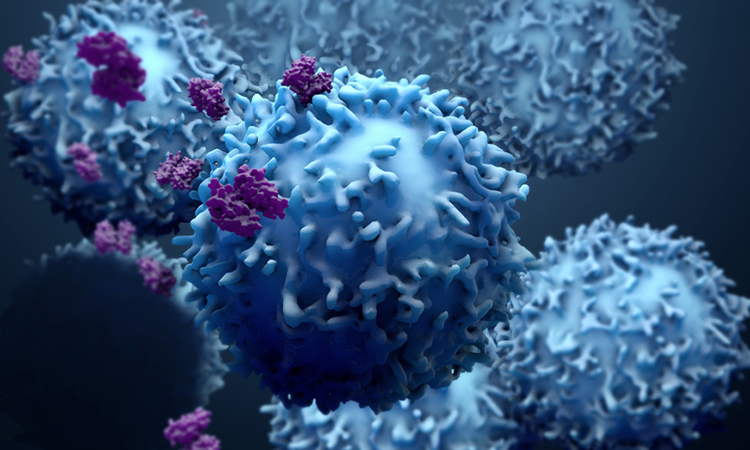The potential of FcγRIIB in immunotherapy
Posted: 17 August 2023 | Taylor Mixides (Drug Target Review) | No comments yet
We exclusively interview Dr Ali Roghanian, Associate Professor at the University of Southampton, UK, Ali is a leading researcher at the forefront of immunotherapy advancements. With a keen focus on the inhibitory IgG FcγRIIB receptor, join us as we dive into Ali’s findings, showcasing the complexities of FcγRIIB and its potential to revolutionise therapeutic approaches.


What is the main focus of the study or research mentioned in the passage?
Many therapeutic monoclonal antibodies (mAb), such as Rituximab and Herceptin, deplete target cells (called direct targeting mAbs) and elicit immunotherapy by engaging activating Fc gamma receptors (FcγRs) on host effector cells. These antibodies are negatively regulated by the inhibitory IgG receptor, FcγRIIB (CD32B). Dogma suggests inhibition is mediated through the FcγRIIB immunoreceptor tyrosine-based inhibition motif (ITIM), negatively regulating immunoreceptor tyrosine-based activation motif (ITAM)-mediated signalling from activating FcγRs.
Hence, the focus of this study was to investigate the inhibitory function of this immune checkpoint receptor in antibody immunotherapy. In this study, we set out to generate a mouse expressing a signalling mutant (no ITIM) human FcγRIIB, named NoTIM mouse, instead of its endogenous inhibitory FcγR. This novel mouse model, in addition to a previously generated human FcγRIIB transgenic (Tg) mouse, along with a panel of FcγRIIB mAbs, were used to develop a deeper understanding of FcγRIIB’s inhibitory functions during mAb immunotherapy and how optimal targeting of FcγRIIB would potentiate mAb therapy.
How do therapeutic antibodies work to elicit immunotherapy through Fc gamma receptors (FcγRs)?
Activating FcγRs are expressed on immune effector cells, such as natural killer (NK) cells, neutrophils and macrophages. Engagement of FcγRs by mAb-opsonised targets, such as cancer cells, results in positive signalling and subsequent killing of opsonised target cell. This is mediated through two major extrinsic immune effector mechanisms, antibody-dependent cellular cytotoxicity (ADCC), antibody-dependent cellular phagocytosis (ADCP), that either mediates the release of mediators that can lyse target cells, or phagocytosis of target cells, respectively.1 NK cells mediate ADCC and myeloid cells, and in particular macrophages, mediate ADCP.
The expression of FcγRIIB on myeloid cells limits their ADCP capability via activating FcγRs, and hence acts as an immune checkpoint to alleviate excess immune activation at steady state.
What is the role of FcγRIIB (CD32B) in negatively regulating these therapeutic antibodies’ activity?
Early studies demonstrated that direct targeting antibodies perform significantly better against tumours in mice lacking the inhibitory FcγRIIB.2 This was long believed to be through FcγRIIB’s negative ITIM signalling in effector myeloid cells. Moreover, recent studies by our group demonstrated that FcγRIIB can remove therapeutic antibodies from the surface of B cells and result in tumour evasion from the immune system.3,4 Additionally, FcγRIIB is significantly upregulated on myeloid effector cells within the bone marrow (a niche resistant in mAb immunotherapy)5 and the hypoxic tumour microenvironment, and contributes to immunosuppression and resistance to mAb immunotherapy.6,7
How did the researchers assess the impact of FcγRIIB on monoclonal antibody (mAb)-mediated depletion of target cells?
FcγRIIB mAbs can be used as direct targeting antibodies to deplete FcγRIIB-positive cells, such as B cells and plasma cells. This can be potentially therapeutic in B cell malignancies and in autoimmunity, where B and plasma cells are implicated. Additionally, antagonistic/blocking FcγRIIB mAbs can block the inhibitory effects of FcγRIIB on effector cells, such as macrophages, and potentiate their cytotoxic and phagocytic potential against target cells. Furthermore, antagonistic/blocking FcγRIIB mAbs limit the endocytosis of therapeutic mAbs from the surface of target B cells.3,8
Following extensive characterisation of a panel of human FcγRIIB mAbs, we investigated their therapeutic potential in a number of preclinical models, including a human FcγRIIB Tg mouse and cell- and patient-derived xenograft models.5 Our results demonstrated that FcγRIIB mAb are efficiently capable of overcoming resistance to mAb therapy and resulted in enhanced depletion of FcγRIIB-positive target cells. As a result, a lead clinical candidate (clone BI-1206) was identified and is currently undergoing assessment in the clinic (ClinicalTrials.gov ID NCT03571568 and NCT04219254). Early indications indicate that this mAb is well tolerated and its combination with Rituximab has so far cured a number of patients.
What were the experimental models used in the study, and how did they differ in terms of ITIM signalling capacity?
As detailed above, 2 mouse models expressing either a wild-type human FcγRIIB Tg or a signalling mutant human FcγRIIB Tg (NoTIM) were used to investigate the contribution of negative signalling in mAb immunotherapy. In NoTIM mice, it was confirmed that the engagement of FcγRIIB failed to induce any phosphorylation and subsequent signalling. Surprisingly, and despite common belief, direct targeting mAbs were equally inhibited in both wild-type FcγRIIB Tg and NoTIM strains, indicating that the negative signalling is indispensable of mAb immunotherapy. Further analysis revealed that to overcome the competition from the inhibitory FcγRIIB with activating FcγRs, a Fc-null FcγRIIB mAb was required.
What were the key findings of the study regarding the impact of FcγRIIB on immunotherapy and activating FcγR engagement?
Our study demonstrates that FcγRIIB inhibits mAb immunotherapy by competing with activating FcγRs, expressed on immune effector cells (e.g., macrophages), rather than by reducing their activation via negative ITIM signalling, as previously believed. Additionally, our data demonstrate that FcγRIIB mAbs which lack a functional Fc domain (i.e., cannot engage effector cells [Fc-null]), but not wild-type FcγRIIB mAbs, would potentiate target cell depletion in experimental models. Collectively, these observations will help design better therapeutics aiming to modulate FcγR interactions. As a result of this study a Phase I clinical trial sponsored by BioInvent International is currently underway (ClinicalTrials.gov ID: NCT05555251), which aims to investigate the efficacy of an engineered Fc-null anti-FcγRIIB (clone BI-1607) in combination with Transtuzumab (anti-HER2) in HER2-positive advanced solid tumours.
Author Bio:


Dr Ali Roghanian is an Associate Professor at the University of Southampton, UK. As a cancer immunotherapy researcher, Dr Ali Roghanian is interested in studying tumour-mediated immunosuppression and the application of targeted therapies to promote an effective anti-tumour immunity. To achieve this, the group is using innovative technologies, including a combination of advanced preclinical models of human cancers (e.g., PDX, CDX, humanized) and complementary platforms (e.g., syngeneic models, cell cultures), and novel reagents (e.g., monoclonal antibodies).
References:
- Dahal LN, Roghanian A, Beers SA, Cragg MS. FcγR requirements leading to successful immunotherapy. Immunol Rev. 2015 Nov;268(1):104-22.
- Clynes RA, Towers TL, Presta LG, Ravetch JV. Inhibitory Fc receptors modulate in vivo cytotoxicity against tumor targets. Nat Med. 2000 Apr;6(4):443-6.
- Lim SH, Vaughan AT, Ashton-Key M, Williams EL, Dixon SV, Chan HT, Beers SA, French RR, Cox KL, Davies AJ, Potter KN, Mockridge CI, Oscier DG, Johnson PW, Cragg MS, Glennie MJ. Fc gamma receptor IIb on target B cells promotes rituximab internalization and reduces clinical efficacy. 2011 Sep 1;118(9):2530-40.
- Vaughan AT, Iriyama C, Beers SA, Chan CH, Lim SH, Williams EL, Shah V, Roghanian A, Frendéus B, Glennie MJ, Cragg MS. Inhibitory FcγRIIb (CD32b) becomes activated by therapeutic mAb in both cis and trans and drives internalization according to antibody specificity. 2014 Jan 30;123(5):669-77.
- Roghanian A, Hu G, Fraser C, Singh M, Foxall RB, Meyer MJ, Lees E, Huet H, Glennie MJ, Beers SA, Lim SH, Ashton-Key M, Thirdborough SM, Cragg MS, Chen J. Cyclophosphamide Enhances Cancer Antibody Immunotherapy in the Resistant Bone Marrow Niche by Modulating Macrophage FcγR Expression. Cancer Immunol Res. 2019 Nov;7(11):1876-1890.
- Hussain K, Liu R, Smith RCG, Müller KTJ, Ghorbani M, Macari S, Cleary KLS, Oldham RJ, Foxall RB, James S, Booth SG, Murray T, Dahal LN, Hargreaves CE, Kemp RS, Longley J, Douglas J, Markham H, Chee SJ, Stopforth RJ, Roghanian A, Carter MJ, Ottensmeier CH, Frendéus B, Cutress RI, French RR, Glennie MJ, Strefford JC, Thirdborough SM, Beers SA, Cragg MS. HIF activation enhances FcγRIIb expression on mononuclear phagocytes impeding tumor targeting antibody immunotherapy. J Exp Clin Cancer Res. 2022 Apr 7;41(1):131.
- Knorr D, Leidner R, Jensen S, Meng R, Jones A, Ballesteros-Merino C, Bell RB, Baez M, Sprott D, Bifulco C, Piening B, Dahan R, Fox BA, Ravetch J. FcyRIIB is a novel immune checkpoint in the tumor microenvironment limiting activity of Treg-targeting antibodies. 2023 Jan 20:2023.01.19.522856.
- Roghanian A, Teige I, Mårtensson L, Cox KL, Kovacek M, Ljungars A, Mattson J, Sundberg A, Vaughan AT, Shah V, Smyth NR, Sheth B, Chan HT, Li ZC, Williams EL, Manfredi G, Oldham RJ, Mockridge CI, James SA, Dahal LN, Hussain K, Nilsson B, Verbeek JS, Juliusson G, Hansson M, Jerkeman M, Johnson PW, Davies A, Beers SA, Glennie MJ, Frendéus B, Cragg MS. Antagonistic human FcγRIIB (CD32B) antibodies have anti-tumor activity and overcome resistance to antibody therapy in vivo. Cancer Cell. 2015 Apr 13;27(4):473-88.
Related topics
Immunotherapy, Targets
Related conditions
Cancer
Related organisations
University of Southampton's Centre for Cancer Immunology
Related people
Dr Ali Roghanian (University of Southampton)








